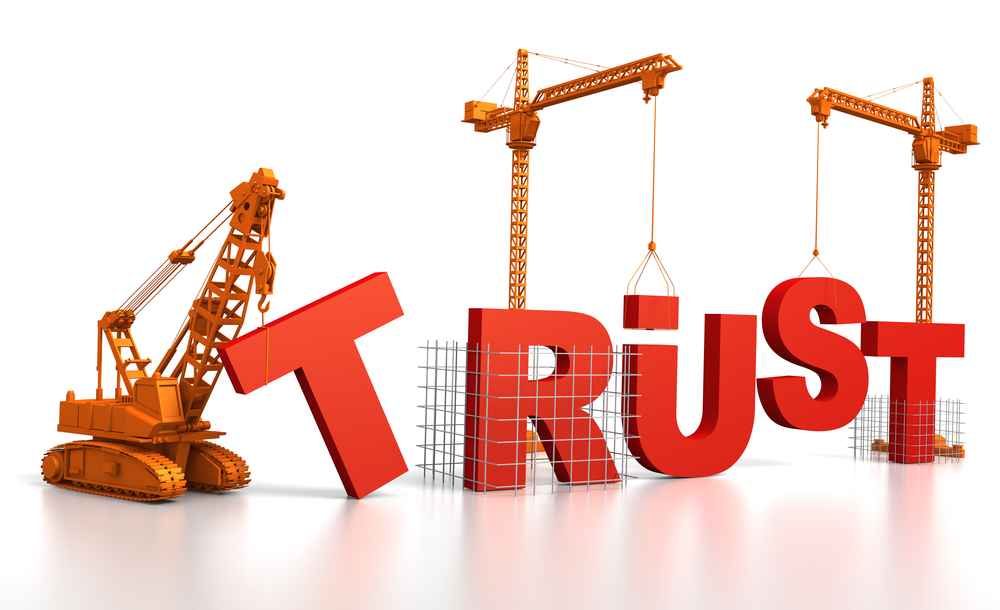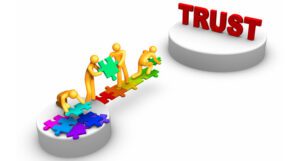
Today, I’m inspired by a recent article in Harvard Business Review by Jamil Zaki titled “Why Cynics Are Less Likely to Succeed,” where he refutes the all too common belief that we must compete to succeed and instead build trust and drive out cynicism. With a competitive mindset, people often go single-mindedly after a goal and sacrifice relationships to secure the win for themselves. According to Zaki and the studies he references, this behavior delivers the opposite of its imagined impact. “Cynics” – people who think the world is a dangerous place and approach the world from a highly competitive posture – report less satisfaction at work, earn lower salaries, and are less likely to be promoted to leadership positions. OUCH!
How does cynicism play out in our projects? Think about a team barreling towards self-destruction. Instead of collaboration and understanding, team members build cases to support their positions and exploit loopholes. They attack before they get attacked. They establish polarized positions locked into proving who is right or who is wrong, focus on who caused the problem instead of helping to find a win-win solution, and grow resentment and distrust that will last well beyond any resolution.
And now, my favorite quote from the article: “Success is not a winner-take-all battle royale. People most often win by building trusting connections and alliances.” Zaki goes on to say that people and teams can change this culture and learn to reap the benefits of cooperation (and, dare I add … collaboration?).
His tips

Make trust the default
Talented teams take teamwork. That means people work together to reach common goals. They show each other grace for the inevitable mistakes that happen. They have each other’s backs and collaborate to solve problems together. They listen to each other and ask questions for understanding. They trust each other to put the project first and consider the needs of each party when balancing difficult decisions.
Fight phantom norms
Teams suffer from what psychologists call “pluralistic ignorance” where individuals privately reject a belief or behavior, and assume others accept it, so they support it publicly. I call this phenomenon “project lore.” Teams develop cultures and shared belief systems from talking about situations in a certain way so much that they finally become accepted as truth. For example, I recently met with a project team that insisted that a root cause of their communication challenge is the fact that the field and office teams were in separate trailers. Just picture the significant difficulty posed by the massive, 15-foot commute between the two trailers. Project lore. And true for this team. Project leaders can help teams bust myths by providing a safe forum for examining these concepts (perhaps a partnering session?).
Challenge team members to critically examine norms, discard the ones without value and realign behind a vision and culture that supports success.
Be the first to trust.
Lead by example. Create an environment where teamwork and collaboration are expected and rewarded over individual performance. Encourage a communal mindset that remembers that all partners of the project team must cross the finish line together for the project to be a resounding success.
Research sponsored by the International Partnering Institute shows that projects with high collaboration have higher success rates than those without it. Project teams who work together often find win-win-win solutions to challenging problems. They build cooperation muscles that help them ride an upward spiral towards more efficient implementation, higher personal satisfaction and long-term relationships. Go for it! Drive out cynicism and deliberately build a collaborative and high-trust culture. Together, your whole team will succeed.
~ Cinda
Cinda Bond, MIPI, has been an OrgMetrics partnering facilitator for more than 10 years. She has facilitated more than 500 sessions for teams throughout the country. She also collaborates with engineering and construction teams to develop large documents containing hundreds of pages for construction contracts and proposals.
For more information please contact Cinda Bond, CindaBond@Orgmet.com / (925)640-9007 (cell), or OrgMetrics RobReaugh@Orgmet.com / (925)449-8300


 Cinda Bond, MIPI, has been an OrgMetrics partnering facilitator for more than 10 years. She has facilitated more than 500 sessions for teams throughout the country. She also collaborates with engineering and construction teams to develop large documents containing hundreds of pages for construction contracts and proposals.
Cinda Bond, MIPI, has been an OrgMetrics partnering facilitator for more than 10 years. She has facilitated more than 500 sessions for teams throughout the country. She also collaborates with engineering and construction teams to develop large documents containing hundreds of pages for construction contracts and proposals.